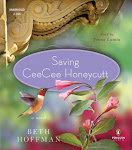Last night I finished reading Team Moon: How 400,000 People Landed Apollo 11 on the Moon by Catherine Thimmesh, the winner of the 2007 Sibert Medal for Children’s nonfiction.
Thimmesh, Catherine.
Team Moon : how 400,000 people landed Apollo 11 on the moon / by Catherine Thimmesh.
Boston : Houghton Mifflin, 2006.
80 p. : ill. (some col.) ; 29 cm.
ISBN: 9780618507573
Includes bibliographical references (p. 70-77) and index.
A Junior Library Guild selection.
Winner of the 2007 Robert F. Sibert Informational Book Medal.
Subjects:
Apollo 11 (Spacecraft).
Project Apollo (U.S.)
Space flight to the moon -- History.
629.454
Annotation:
Moments after the Lunar Module Eagle had separated from the Command Module Columbia, above the surface of the moon to begin its decent, an alarm sounded. The speech for President Nixon in the event the astronauts died on the moon had already been written. Would he need to deliver it?
Back on earth at mission control in Houston the Flight Controller called on the expertise of the Apollo team. 400,000 people were working with the astronauts, everyone in Mission Control, the engineers working for the contractors that built the Eagle, the Columbia and the parachute system that would return them to earth, the computer programmers, the seamstresses who sewed the spacesuits for the moonwalk, and the radio telescope operators in Australia battling 70 miles an hour winds to capture the television signal and transmit it to an anxious planet. Twenty seconds after the call from Eagle the astronauts were told to proceed with the landing as long as the alarm was not constant. Eleven minutes later Neil Armstrong and Buzz Aldrin became the first humans to land a spacecraft on the moon.
Review:
It’s July 1969, moments after the Lunar Module Eagle had separated from the Command Module Columbia, and 33, 500 feet above the surface of the moon. The Eagle is just beginning its decent.
Suddenly, the master alarm in the lunar module rang out for attention with all the racket of a fire bell going off in a broom closet. “Program alarm,” astronaut Neil Armstrong called from the LM (‘LEM’) in a clipped but calm voice. “It’s a twelve-oh-two.”
…
Translation: We have a problem! What is it? Do we land? Do we abort? Are we in danger? Are we blowing up? Tell us what to do. Hurry!
The speech for President Nixon to deliver in the event the astronauts died on the moon had already been written. Fortunately, other back-up plans were in place. Back on earth at mission control in Houston, the Flight Controller looked to mission controller for guidance and navigation, who intern was in touch with the computer programmer in the backroom, meanwhile the Capsule Communicator (CapCom) recalled a similar alarm in a simulated training mission. The LM’s computer was momentarily too busy. Twenty seconds from the call from Eagle the CapCom relayed the message to proceed with the landing as long as the alarm was not constant. Eleven minutes later Neil Armstrong and Buzz Aldrin became the first humans to land a spacecraft on the moon.
The subtitle says it all, 400,000 people were working with the astronauts, everyone in Mission Control, the engineers working for the contractors that built the Eagle, the Columbia and the parachute system that would return them to earth, the computer programmers, the seamstresses who sewed the spacesuits for the moonwalk, and the radio telescope operators in Australia battling 70 mile an hour winds to capture the television signal and transmit it to an anxious planet.
Thimmesh has carefully selected stories of people behind the headlines and presented them in a marvelously illustrated chronicle of the near-crisis by near-crisis events from lift off to splash down during the first moon landing. The Association for Library Service to Children, a division of the American Library Association awarded the author the 2007 Robert F. Sibert Informational Book Medal for the most distinguished informational book published in English during the preceding year.

